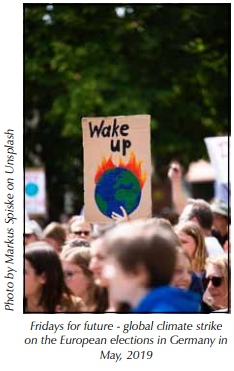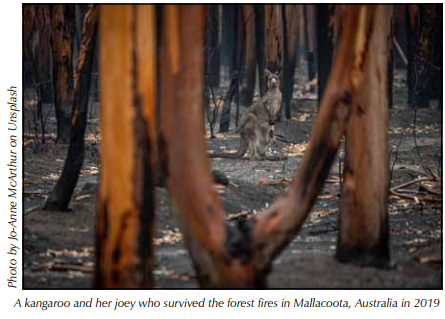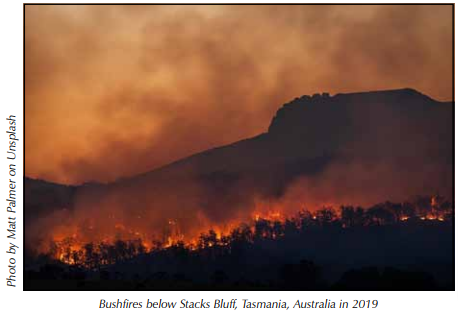A Heated Planet
Some Recent Extreme Weather Events
Akhilesh Patil*

At the ‘Leaders Summit on Climate,’ hosted by U.S. President Joe Biden, he announced that America would aim to cut its greenhouse gas emissions 50 per cent to 52 per cent below 2005 levels by 2030. It’s a steep near-term target among wealthy, industrialised nations but comes close on the heels of terrifying risks of climate change
Even recently, at least eight people have died and six more critically injured after a glacier broke off, leading to an avalanche in Sumna
area of Joshimath Sector in Uttarakhand’s Chamoli district. The tragedy comes in the wake of another environment nightmare, just two months ago, when another glacier disaster in Chamoli caused a flash flood, decimating over 200 lives.1
Following is a curated list of events that tell us in no uncertain terms that we are already living through climate change’s worstcase scenario.
One of the Hottest Years on Record
As per the provisional report published by the World Meteorological Organisation (WMO) on the State of the Climate, 2020 was one of the three hottest years on record. The report, based on the data collected from January till October 2020 was published on December 2 of the same year. It was further updated on January 15, 2021.2
An exceptionally hot 2020 couldn’t be evaded despite a La Niña event, in the later half of the year. La Niña is a weather pattern causing water in the eastern Pacific to be colder than usual.
The year also experienced multiple lockdowns all around the world, significantly slowing place above the Arctic Circle to experience temperatures over 100 degrees Fahrenheit, or about 380 Celsius, in June, mainly because of all-time high wildfires in the region.


It burnt almost an area roughly the size of Belgium.5 In Brazil, the Pantanal wetlands of the Amazon rain forest experienced one of its worst wildfires in the past 13 years. As per the National Interagency Fire Center of the U. S. in the state of California,
10,000 fires had burned over 4.2 million acres, effectively more than 4% of the state’s land. It was the largest wildfire season recorded in California’s modern history
down carbon emission. Yet it couldn’t impact the ongoing warming process in a significant way. It also highlights how powerful human contributions to global warming have become. Data analysed by the WMO shows that 2011-20 was the warmest decade on record, with 2016, 2019 and 2020 being the top three hot years.
A Year of Record Wildfires
Large chunks of the planet went up in a blaze this year. While massive wildfires are not unknown to certain parts of the world, their frequency has gone up significantly. The usual suspects are to blame --- rising temperatures, dry summers, severe droughts and of course, human errors. This year particularly witnessed record levels of fire activities in regions not witnessing the phenomenon earlier. Like always, the western part of the United States, mainly the state of California, and several states of Australia experienced wildfires during their summers (Although Australia has had a quiet fire season in 2021, compared to the Armageddon like blazes in 2019 and 2020). However, parts of the Arctic, Siberia, Indonesia, Brazil, Argentina, China, Ukraine, Poland and Africa experienced their worst wildfires in decades if not all of the recorded history.3 According to multiple studies, only 10 to 15 per cent of wildfires occur on their own in nature, rest are caused because of human errors like unattended camp or debris fire, arson, deforestation for agriculture etc.4 However, constant dry weather and warm temperature have been making the situation worse.
In 2020, the Russian town of Verkhoyansk became the first
Devastating Tropical Storms
Super-cyclone Amphan tore through the coast of eastern India and Bangladesh in May 2020, ripping apart cities, mangrove forests, embankments and homes with its 100-mile-per-hour winds and walls of rain.
Electricity transformers and poles exploded in showers of light, while giant trees cracked open roads even as they smashed into the ground.
Other cyclones too made their rounds of the country, such as Nisarga, BOB 03 and Nivar, wrecking havoc and devastating lives. But Amphan stood out even in this calamitous crowd. It was the strongest storm recorded in the past two decades. The cyclone caused damage worth `1.02 lakh crore, and destroyed over 28.6 lakh homes with an estimated loss of `28,650 crore, as per the report submitted by the Inter-Ministerial Central Team (IMCT), after its assessment in the state of West Bengal.6
It is important to note that, seven of the 10 strongest landfalls in recorded history have occurred since 2006. The frequency of rapid-intensification of tropical storms has increased over the past four decades, and this increase has been linked to climate change. According to experts, the overall increase in atmospheric temperature has raised the ocean temperatures and this is the main reason behind the rapid intensification of storms.7
Record Low Arctic Sea Ice
Arctic sea ice reached its annual minimum on September 15, 2020, at 3.74 million sqkm. This was its second-lowest extent and volume ever recorded, after September 17, 2012. The readings were put out by the National Snow and Ice Data Center (NSIDC).8 The 2020 minimum is the second-lowest in its nearly 42-year satellite record. Heatwaves and wildfires in Siberia adversely affected the ice extent in the region.
Even in July, 2020 less sea ice covered the Arctic Ocean than in any other July since scientists began keeping track of the phenomenon. In the 1980s the ice covered an average of about 9.8 million square kilometres, roughly the area of the U. S. or Canada. In July, 2020, ice covered only 7.2 million sqkm. Since 1979, sea ice has declined by an average of 70,000 square kilometre a year.9 At this rate in just 15 years from now, the Arctic Ocean may be functionally ice-free for some parts of the year, according to the study ‘Sea-ice-free Arctic during the Last Interglacial supports fast future loss,’ published in the journal Nature Climate Change in August 2020. The study projects the Arctic to be ice-free in the summer, from as early as 2035.10 Ice cover in the Arctic is of great significance because it influences weather patterns globally and its loss could leave a severe impact on climate across the world. Therefore, as the study suggests, this should be of huge concern to Arctic communities and climate scientists.11
Endnotes
1 Scroll Staff. (2021, April 24). Uttarakhand: Eight killed, six injured as glacier burst leads to avalanche in Chamoli. Scroll.in. Retrieved April 24, 2021 from https://bit.ly/3sNuTJz
2 Press Release. (2021, January 14). Cooling La Niña event failed to tame the global heat. World Meteorological Organization. Retrieved February 27, 2021 from https://bit.ly/3us80gG
3 Bir, Burak. (2020, December 25). Wildfires, forest fires around world in 2020. Anadolu Agency. Retrieved January 31, 2021 from https://bit.ly/3pSTACI
4 Wolters, Claire. (2019, December 6). Here’s how wildfires get started—and how to stop them. National Geographic. Retrieved February 7, 2021 from https:// bit.ly/3dGTRGy 5 Penney, Veronica. (2020, September 16). It’s Not Just the West. These Places Are Also on Fire. The New York Times. Retrieved March 10, 2021 from https:// nyti.ms/3dHqF2d 6 Singh, Shiv Sahay. (2020, June 7). Bengal pegs cyclone Amphan damage at `1.02 lakh crore. The Hindu. Retrieved February 17, 2021 from https://bit.ly/37MIj0G 8 Press Release. (2020, September 21). Arctic sea ice at minimum extent for 2020. National Snow and Ice Data Center. Retrieved January 19, 2021 from https://bit.ly/3kqsilW 9 Borunda, Alejandra. (2020, August 13). Arctic summer sea ice could disappear as early as 2035. National Geographic. Retrieved February 17, 2021 from https://bit.ly/3dGTRGy 10 Guarino, MV, et al. (2020, August 10) Sea-ice-free Arctic during the Last Interglacial supports fast future loss. Nature Climate Change. Vol. 10, 928–932. Retrieved March 1, 2021 from https://go.nature.com/3dNDTu3 11 Berardelli, Jeff. (2020, August 12). In just 15 years, the Arctic Ocean may be ice-free in summer, study says. CBS News. Retrieved March 12, 2021 from https://bit.ly/3bGY1eO NEXT »

Vision
To strive for an India where every citizen is respected and fairly treated.

Mission
To champion vital public causes

Objective
To defend and fight for the rights and entitlements of all groups of citizens.
